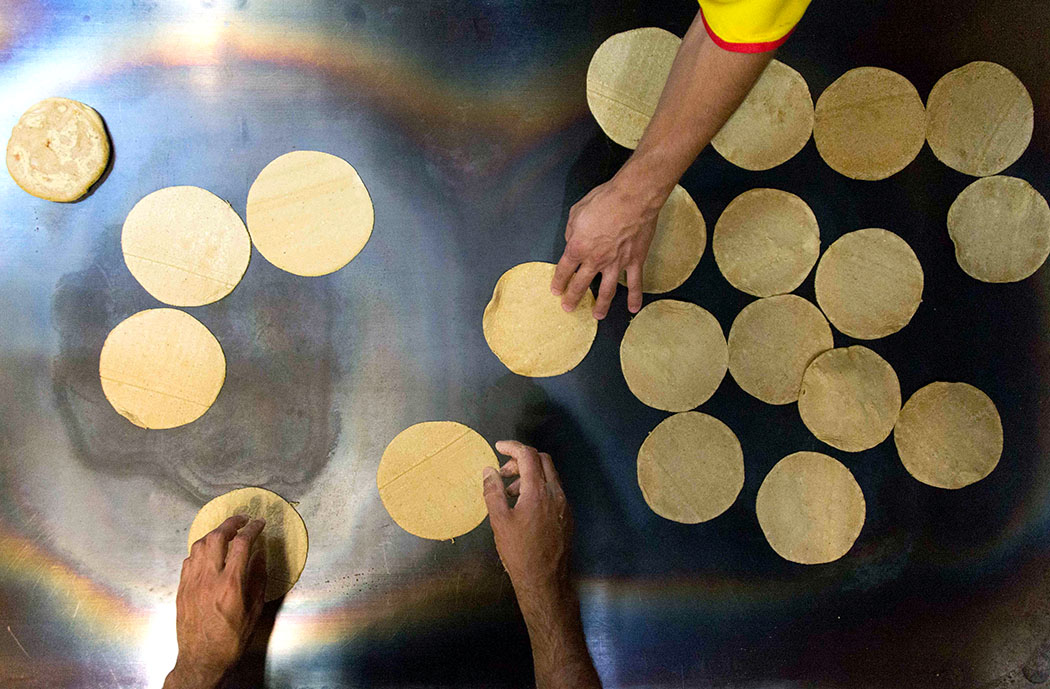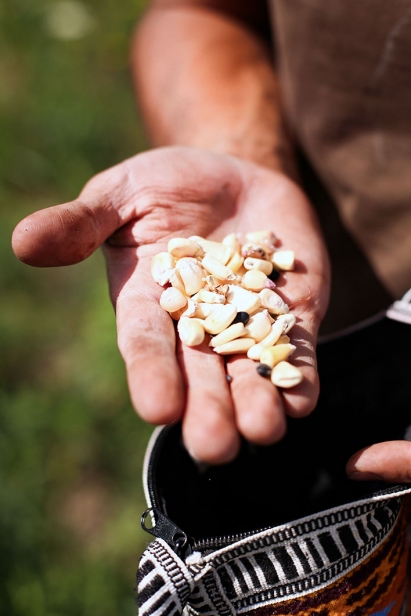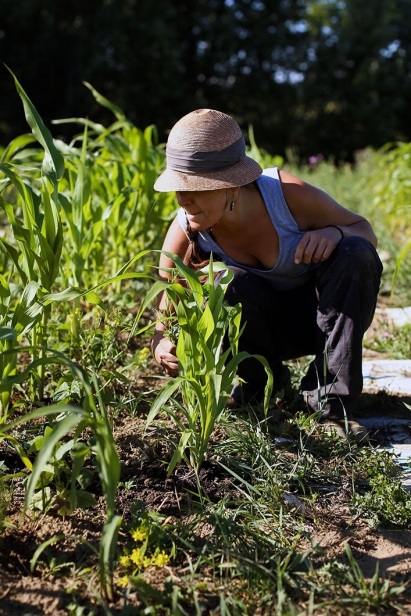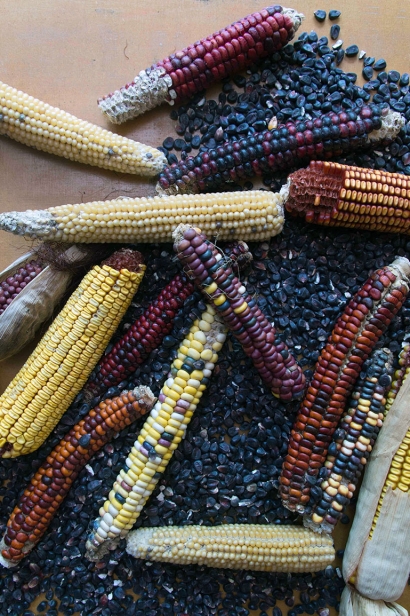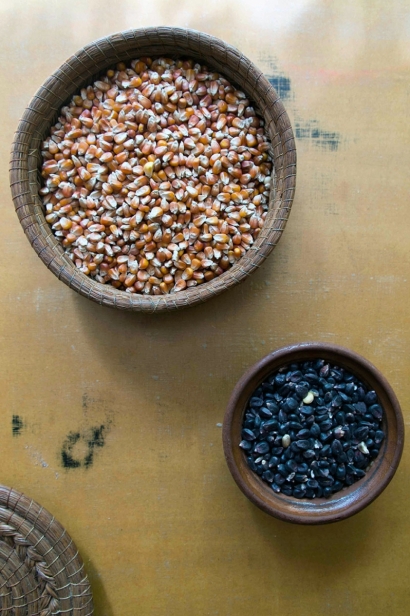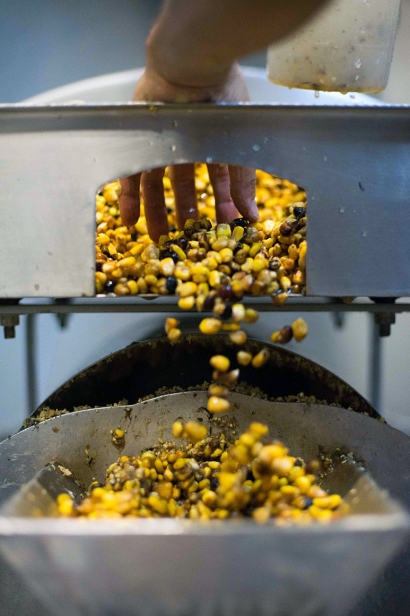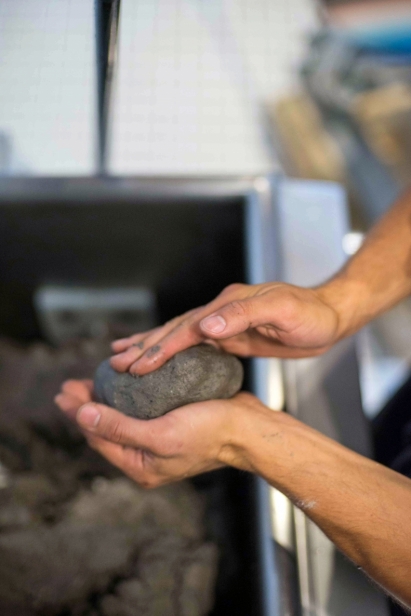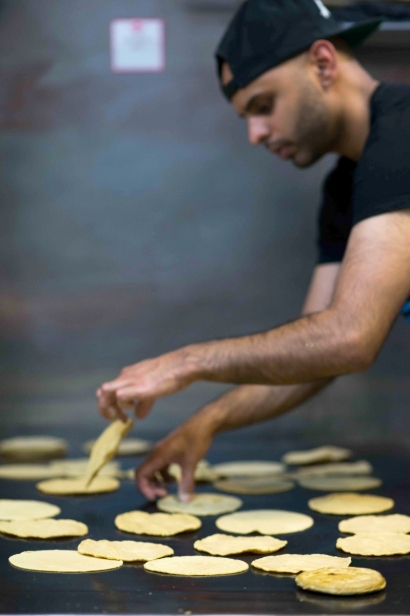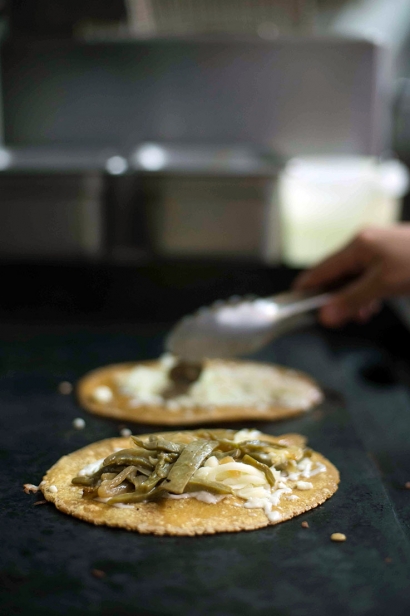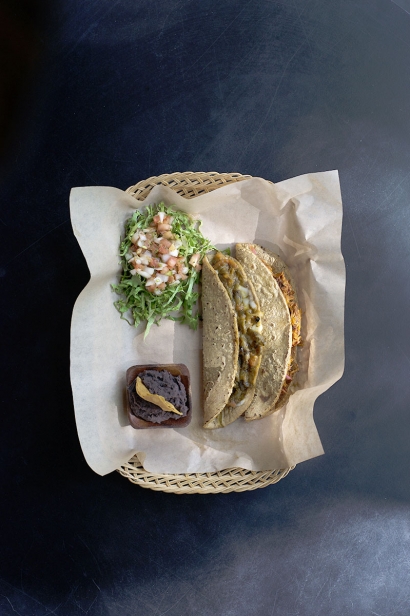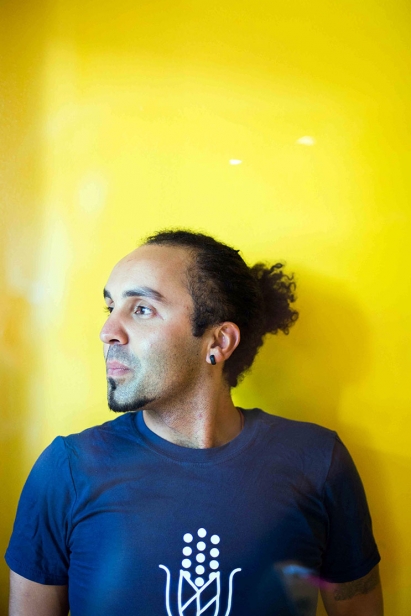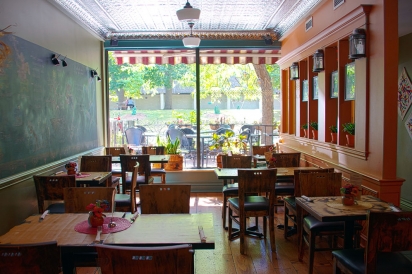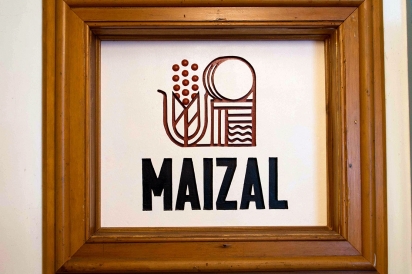Making Tortilla One Cob at a Time
For months, we’d been anticipating the cornucopia of produce that’s now available at farmers’ markets and grocery stores. The bounty arrived and we can finally sink our teeth into the season’s first truly local corn. But many of us already had our first corn months ago, when it was trucked in from South America — perhaps hoping the summer barbecue season, in its smoky, fragrant glory, could be expedited by a cob of corn.
And it might feel odd, even dissonant, to celebrate the harvest season with corn, which has become an adversary to local food. Corn, after all, is the backbone of our globalized industrial food system, where cheap beats local. Most of our processed foods contain inexpensive corn derivatives. And fields that used to grow diverse varieties of local corn have been supplanted by genetically modified monocultures, reaching as far as the eye can see. (Corn is one of the few genetically modified crops grown in Canada.)
So if you’re yearning to try truly local, non-modified Ontario-grown corn this harvest season, you’ll want to visit Maizal, a Mexican restaurant in Toronto’s Liberty Village neighbourhood, co-owned by Ivan Wadgymar and Gabriela Ituarte. It may seem like a strange recommendation since Maizal serves dishes cooked with ingredients that mostly grow thousands of kilometres away, such as avocado, cactus, lime and cacao — but at the heart of Maizal’s menu are its tortillas, made from locally grown heritage maize.
Wadgymar and Ituarte, who have degrees in environmental studies and social work respectively, aren’t trained chefs — they learned everything they know about traditional Mexican tortilla-making and cooking at home, from their families who have origins in Mexico City. “Gabriela’s passion was to open a restaurant, mine has always been for local agriculture,” Wadgymar explains. He plans on spending most of next summer in Mexico to “gather information, learn more and do frontline research” on the subject of Mexican cuisine and farming.
The name “Maizal” (pronounced “mysal”) is a combination of “maize” and “-al”, which together mean “a parcel of land used for growing maize.” While no maize is grown at the restaurant itself, plenty grows at the couple's farm in Schomberg, about an hour north of Toronto. The farm, Cavaleiro, is a co-operative that Wadgymar joined in 2014. Prior to that, he sowed the fields at McVean Farm in Brampton and took part in their new farmers incubator program, which supported new farmers by giving them access to land, equipment and infrastructure, along with training and mentorship. (The program, which began 10 years ago as a partnership with the Toronto and Region Conservation Authority and FarmStart, no longer exists due to lack of funding, according to the FarmStart website.)
Maizal’s tortillas are as good as tortillas get. Some days they’re blue, other days red, green or deep yellow. The different colours come from distinct gene lines. Wadgymar and Ituarte practise the agro-art of seedsaving (selecting kernels from the most desirable cobs to plant next season), which means they’re creating beautiful food, but also strengthening Ontario maize’s gene pool.
Their tortillas have the soft chewiness you’d find in a freshly baked, glutinous loaf of bread — but they’re slightly gritty, like a good cornbread. Unlike your run-of-the-mill corn or wheat tortilla, these are maize tortillas, from a longer and more palate-pleasing tradition.
Maize is very similar to corn; in fact, both are varieties of the same species, Zea mays. Corn is the sweet product of our industrial food system, where sweetness is the mark of quality. Maize is less prized for its sugar than its starch, which is slower to digest and keeps us satiated longer.
The harvest happens in November and can last until January or February — Wadgymar fondly recalls harvesting corn in the snow this past winter. Unlike the corn you boil and slather with butter at the dinner table, the cobs stay dry and dehydrate on the stalk. Once picked, they then dry even longer. Wadgymar hangs his cobs in the farm’s barn and “all over [his] mother’s garage,” he laughs. The cobs can also be dried in something called a corn crib, a structure which allows the cobs to lay flat. The kernels must be completely dry so Wadgymar and Ituarte can use them year-round.
The cobs pass through a special tool resembling a spiralizer or grinder to remove the individual kernels. Although the process could easily be done by an automated machine, Wadgymar still does it by hand, finding satisfaction and calm in the task.
Each day, Maizal makes fresh tortillas by boiling the kernels with slaked lime to soften them, which produces nixtamal, a thick porridge. That process takes place in the kitchen of Baby Huey, a bar on Ossington — a necessary outpost, since Maizal has outgrown its own walls. The lime, a form of calcium hydroxide, changes the entire chemistry of the kernel, Wadgymar says, further explaining that the nutrients inside the corn — niacin, iron and calcium — become more easily absorbed by the body after the corn is boiled this way.
Using a stone grinder imported from Mexico, Wadgymar grinds the nixtamal to produce a maize dough called masa, which he then rolls into small balls by hand, before pressing it to create tortillas or tlaxcalli. The tortillas are then lightly browned on the stove — without oil — and to make tacos or quesadillas. Soaking the corn in this fashion, milling it without converting it to flour, and avoiding all preservatives and glues keeps the process true to a tradition thousands of years old. “We are the anti-shelf-life tortilla,” Wadgymar says.
Maizal’s maizal is one acre, enough land to grow two to three hundred pounds of maize, which was more than enough when the restaurant opened in 2012. But now Wadgymar has to supplement with maize from another farm just to keep up with demand, since customers can now buy tortillas and chips at the restaurant to take home. Farmers’ markets also keep them busy. The Maizal team makes weekly appearances at the Sorauren, Trinity Bellwoods and Annette Village markets in Toronto.
Most of the maize used at Maizal now come from Samsara Fields, a 10-acre farm plot in Waterford, Norfolk County, run by his friends J.P. Gural and So Young Lee. Though it may not be his farm, Wadgymar is involved with every aspect, from planting to harvest. “We’re always trial-and-erroring,” he says about the maize growing at Samsara Fields. He’s also involved in seed selection at Samsara, having “taken out a few types of corn [he] was not fond of for tortilla making.” In 2015, all of Wadygmar and Ituarte’s hard work earned them a Premier’s Award in Agri- Food Innovation Excellence.
Currently, the heirloom maize is grown from kernels that originated in Mexico or from American Mennonites, but some of the next harvest will come from kernels given to Wadgymar by Six Nations of The Grand River, a First Nations reserve near Hamilton. The seeds are in the ground and growing well, he says.
Wadgymar describes Maizal as serving “Indigenous Mexican cuisine.” This isn’t Tex-Mex and it’s not Hip-Mex — this is Mexican food grown and prepared in the spirit of Wadgymar’s ancestors. The tortillas are as they were thousands of years ago in Mexico, and the maizal is cared for with reverence and respect. Indigenous Mexican food and the food of Ontario’s First Nations and Indigenous peoples share a long history. Maize originated thousands of years ago in what is now Mexico before travelling up to what is now Ontario, kernels of agricultural knowledge migrating with the kernels of maize. The ancient agricultural practice known as the “three sisters,” in which soil fertility is maintained by planting maize, beans and squash together, is also being adapted in Maizal’s fields.
The relationship between Maizal’s restaurant and farm is more symbiotic than you may think. Each week, Wadgymar takes food scraps from the restaurant to the farm to feed the animals, which include ducks, chickens, turkeys, pigs, sheep and donkeys. Although none of the animals is slaughtered for the restaurant, they’ve hosted barbacoa events at the farm, where a sheep has been slow-roasted over a fire pit. The rest of the food scraps nourish the cornrows as compost. Maizal’s “zero-food waste” policy is an example of closed-loop farming that’s unusual for an urban eatery. The restaurant is table-to-farm no less than farm-to-table.
Since Maizal makes its tortillas from dried maize, you can get in touch with the local harvest any time of year. But a word of caution before visiting the restaurant: You might find a door closes — and you can never go back to store-bought tortillas.
Maizal
133 Jefferson Ave., Toronto, Ont.
maizal.ca | 647.351.0133 | @maizalto


